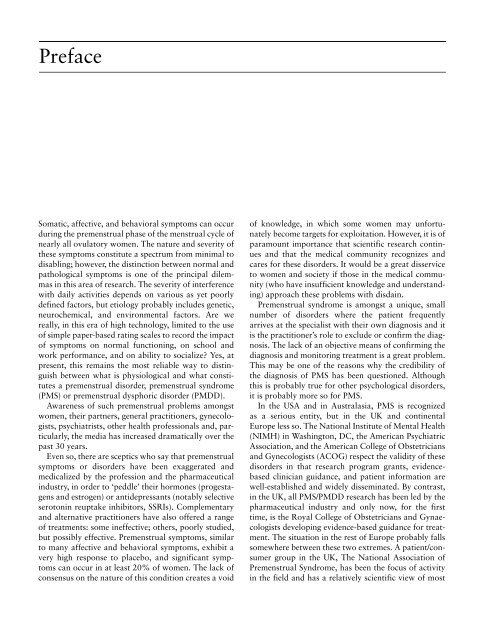Premenstrual Syndromes : PMS and PMDD - Rutuja :: The site ...
Premenstrual Syndromes : PMS and PMDD - Rutuja :: The site ...
Premenstrual Syndromes : PMS and PMDD - Rutuja :: The site ...
You also want an ePaper? Increase the reach of your titles
YUMPU automatically turns print PDFs into web optimized ePapers that Google loves.
Preface<br />
Somatic, affective, <strong>and</strong> behavioral symptoms can occur<br />
during the premenstrual phase of the menstrual cycle of<br />
nearly all ovulatory women. <strong>The</strong> nature <strong>and</strong> severity of<br />
these symptoms constitute a spectrum from minimal to<br />
disabling; however, the distinction between normal <strong>and</strong><br />
pathological symptoms is one of the principal dilemmas<br />
in this area of research. <strong>The</strong> severity of interference<br />
with daily activities depends on various as yet poorly<br />
defined factors, but etiology probably includes genetic,<br />
neurochemical, <strong>and</strong> environmental factors. Are we<br />
really, in this era of high technology, limited to the use<br />
of simple paper-based rating scales to record the impact<br />
of symptoms on normal functioning, on school <strong>and</strong><br />
work performance, <strong>and</strong> on ability to socialize? Yes, at<br />
present, this remains the most reliable way to distinguish<br />
between what is physiological <strong>and</strong> what constitutes<br />
a premenstrual disorder, premenstrual syndrome<br />
(<strong>PMS</strong>) or premenstrual dysphoric disorder (<strong>PMDD</strong>).<br />
Awareness of such premenstrual problems amongst<br />
women, their partners, general practitioners, gynecologists,<br />
psychiatrists, other health professionals <strong>and</strong>, particularly,<br />
the media has increased dramatically over the<br />
past 30 years.<br />
Even so, there are sceptics who say that premenstrual<br />
symptoms or disorders have been exaggerated <strong>and</strong><br />
medicalized by the profession <strong>and</strong> the pharmaceutical<br />
industry, in order to ‘peddle’ their hormones (progestagens<br />
<strong>and</strong> estrogen) or antidepressants (notably selective<br />
serotonin reuptake inhibitors, SSRIs). Complementary<br />
<strong>and</strong> alternative practitioners have also offered a range<br />
of treatments: some ineffective; others, poorly studied,<br />
but possibly effective. <strong>Premenstrual</strong> symptoms, similar<br />
to many affective <strong>and</strong> behavioral symptoms, exhibit a<br />
very high response to placebo, <strong>and</strong> significant symptoms<br />
can occur in at least 20% of women. <strong>The</strong> lack of<br />
consensus on the nature of this condition creates a void<br />
of knowledge, in which some women may unfortunately<br />
become targets for exploitation. However, it is of<br />
paramount importance that scientific research continues<br />
<strong>and</strong> that the medical community recognizes <strong>and</strong><br />
cares for these disorders. It would be a great disservice<br />
to women <strong>and</strong> society if those in the medical community<br />
(who have insufficient knowledge <strong>and</strong> underst<strong>and</strong>ing)<br />
approach these problems with disdain.<br />
<strong>Premenstrual</strong> syndrome is amongst a unique, small<br />
number of disorders where the patient frequently<br />
arrives at the specialist with their own diagnosis <strong>and</strong> it<br />
is the practitioner’s role to exclude or confirm the diagnosis.<br />
<strong>The</strong> lack of an objective means of confirming the<br />
diagnosis <strong>and</strong> monitoring treatment is a great problem.<br />
This may be one of the reasons why the credibility of<br />
the diagnosis of <strong>PMS</strong> has been questioned. Although<br />
this is probably true for other psychological disorders,<br />
it is probably more so for <strong>PMS</strong>.<br />
In the USA <strong>and</strong> in Australasia, <strong>PMS</strong> is recognized<br />
as a serious entity, but in the UK <strong>and</strong> continental<br />
Europe less so. <strong>The</strong> National Institute of Mental Health<br />
(NIMH) in Washington, DC, the American Psychiatric<br />
Association, <strong>and</strong> the American College of Obstetricians<br />
<strong>and</strong> Gynecologists (ACOG) respect the validity of these<br />
disorders in that research program grants, evidencebased<br />
clinician guidance, <strong>and</strong> patient information are<br />
well-established <strong>and</strong> widely disseminated. By contrast,<br />
in the UK, all <strong>PMS</strong>/<strong>PMDD</strong> research has been led by the<br />
pharmaceutical industry <strong>and</strong> only now, for the first<br />
time, is the Royal College of Obstetricians <strong>and</strong> Gynaecologists<br />
developing evidence-based guidance for treatment.<br />
<strong>The</strong> situation in the rest of Europe probably falls<br />
somewhere between these two extremes. A patient/consumer<br />
group in the UK, <strong>The</strong> National Association of<br />
<strong>Premenstrual</strong> Syndrome, has been the focus of activity<br />
in the field <strong>and</strong> has a relatively scientific view of most


